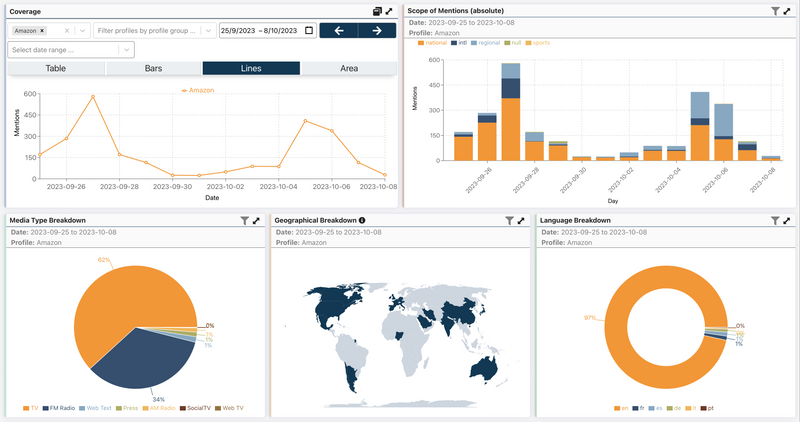
As one of the leading providers of media monitoring and THE specialist for monitoring broadcast media, eMedia Monitor carried out a case study that illustrates the benefits of using a media monitoring strategy to navigate a crisis.
The focus is on the retail giant Amazon: The American multinational founded by Jeff Bezos, which is one of the most influential companies in the world, faces legal accusations that may cause damage to the company.
Following, we take a look at the main challenges for the company and how valuable a media monitoring strategy can be in such situation. For the investigation, we used eMM’s state-of-the-art media monitoring platform.
In the US, Amazon is being sued by seventeen states and the federal trade commission. A sweeping antitrust lawsuit accuses the company of inflating prices, stalling competition, and making it difficult for consumers to find sellers offering lower prices.
The lawsuit comes after a four year investigation and years of complaints against the tech giants. It is the latest of several government challenges against big techs with Google and Meta currently facing antitrust lawsuits too.
Faced with this situation, there are several challenges for Amazon such as dealing with headlines and media coverage that damage its reputation; addressing investor concerns that may influence the stock price; or keeping an eye on regulatory bodies that monitor its activity and that may lead to penalties.
There are a variety of ways for Amazon to deal with these challenges, but the most important one to save the company’s reputation is to try to regain control over narratives. Thus, it is essential to implement a comprehensive media monitoring strategy, which allows keeping track of every mention about the company and the case as well as to react promptly.
More than 15 years of experience in the industry have led eMM to the definition of the four pillars of an effective media monitoring service for crisis management: constant, automated, comprehensive, and immediate news tracking.
This approach can be skilfully implemented with the fully automated eMM Dart platform with which the selected media were monitored 24/7. Nothing escapes the system: it sends out alerts in real time as soon as Amazon is mentioned.
The focus of this media analysis is on broadcast, and for good reason. Information that ends up on TV and radio is well-researched and surveys show the highest levels of trust and reliability in these sources, in contrast to social networks. Broadcast therefore has a major influence on consumers and opinion formers. In addition, these media have an enormous reach and are consumed all around the globe.
The key insights below were generated by the fully automated eMM Dart media monitoring platform, visualising the search results for the buzz around the Amazon lawsuit:

Looking at more than 2.800 media outlets (including 2.475 TV & radio channels, complemented by the most relevant press, web text, podcast, social TV, and web TV sources), we found that Amazon was mentioned 580 times the day that the lawsuit against the company was filed (2023-09-27).
Coverage over a longer period (two weeks, from 2023-09-25 to 2023-10-08) shows that the legal accusations had a big media impact and produced a high peak of mentions. In total, Amazon was mentioned around 2.489 times – that is 1.705 times more mentions that the previous two weeks. According to the data, mostly national and regional media reported on the topic but the amount of international media coverage particularly increased the day that the lawsuit was filed.

Claims made against one of the most popular companies of our time sparked interest worldwide. eMM’s widest worldwide media coverage allowed to see that mentions spread all over the five continents but it was in the UK (992), the US (875), and in India (77) where the topic was discussed the most. The discussion was mostly driven by English-speaking media (97%) but there were also mentions from media sources in French, Spanish, German, Italian or Portuguese.
Regarding the type of media that led coverage, in this case TV and radio represented more than three quarters of the mentions about the company. The headlines about Amazon disseminated on TV (62%) and radio (34%) have reached a wide audience around the world.

When it comes to specific messages, news mentions are mostly negative and neutral. We looked at the top 5 channels that mentioned the lawsuit and summarized their main narratives. This is what we found:
Through observant media monitoring and proactive crisis management, Amazon should be able to achieve substantial results:
In the face of a lawsuit with the potential to damage Amazon’s reputation and stability, the company can benefit greatly from implementing a media monitoring strategy.
As we have seen, powered with an automated media monitoring solution such as the eMM Dart system, the company can monitor the media in real time, discover the sentiment towards their brand, and prepare an effective reaction. In short, the company can manage the crisis in a more effective way by controlling the narratives.
Amazon’s use case serves as an example of the importance of implementing media monitoring in today’s fast changing business environment. Media monitoring can be a life jacket for any company facing a crisis. If you are interested in learning more about how you can benefit from media monitoring solutions by eMedia Monitor yourself or would like to book a free demo with eMM contact one of our experts now: